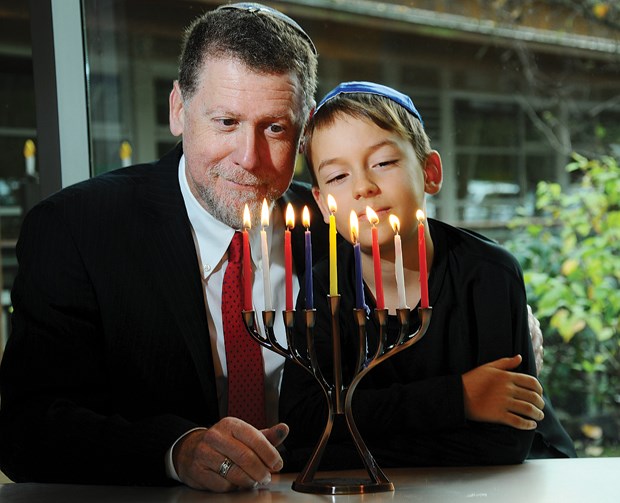Rabbi Shmuel Birnham is a self-described anomaly when it comes to his own Hanukkah history.
"My parents were Jewish, but secular and somewhat anti-religious," reveals Birnham, a rabbi at the Har El synagogue in West Vancouver.
The Long Island, New York native first celebrated Hanukkah as a 27-year-old when he lived in Israel for a year.
"It was lovely," recalls Birnham. "It was beautiful. In Israel many people have a glass box outside their front door and that's where they put the menorah, so it's really quite moving and beautiful."
Hanukkah, while seemingly a popular holiday, is actually a minor event on the Jewish calendar. Passover, Rosh Hashanah and Yom Kippur have more prominence, especially the latter as it's the holiest day of the year.
"In Israel, Hanukkah is a nice holiday, but it's a minor holiday," says Birnham. "In the West, especially in North America with Christmas so close by, we think this is what elevated the importance and the place that Hanukkah plays." This year Hanukkah begins on the evening of Dec. 6 and, of course, runs for eight nights as is the tradition. People who celebrate Hanukkah, for the most part, observe the holiday at home with their families.
Traditional foods are prepared with a focus on fried fare such as jelly doughnuts (sufganiyot) and latkes, which are pancakes made out of potatoes and onions.
"It's a lovely smell at this time of year, the potatoes and the onions and the oil. All these things cooking permeates the house," says Birnham.
Then comes the lighting of the menorah, a nine-branched candelabrum illuminated on each of the eight nights. The menorah is then placed in a home's window to advertise "the many miracles that happened."
"It really is inspiring because Hanukkah is in the dark, dark time of the year, and you're bringing light," says Birnham. "Any spiritual understanding to bring light to the dark is really powerful." Traditional Hanukkah foods are cooked in oil to honour the miracle of the "one jar of oil," explains Birnham. According to Jewish religious stories, after many battles destroyed the temple in Israel during the second century BCE, it was reclaimed and rededicated, but when the congregants went to light the menorah in the temple they discovered there was only one jar of oil. To get more of the sacred olive oil they needed to travel four days away.
"And the miracle that happened is that one jar of oil burned for eight days until the new jar came back," says Birnham, adding it's a story many people are familiar with. During Hanukkah, kids also play games such as spin the dreidel, which involves a four-sided top with a Hebrew letter on each side. Older generations might remember receiving a small gift every night of Hanukkah, culminating in a large present on the eighth night "in the same way that has become commercialized," says Birnham.
Instead of gifts, though, Birnham encourages his congregants to donate to a charity and to focus on equality, patience, gratitude and deepening that awareness in their lives.
There will be a public lighting of the menorah in the West Vancouver Community Centre's atrium on Tuesday, Dec. 8 at 6:15 p.m., the third night of Hanukkah. Everyone is invited to enjoy jelly donuts, hot chocolate and some singing, says Birnham, who is expecting a couple hundred people to attend including the mayor and some other local dignitaries.
The Har El Hebrew school children look forward to Hanukkah, says Birnham, explaining how there is an annual celebration and plays they put on.
"It's a big thing for the kids," says Birnham.



